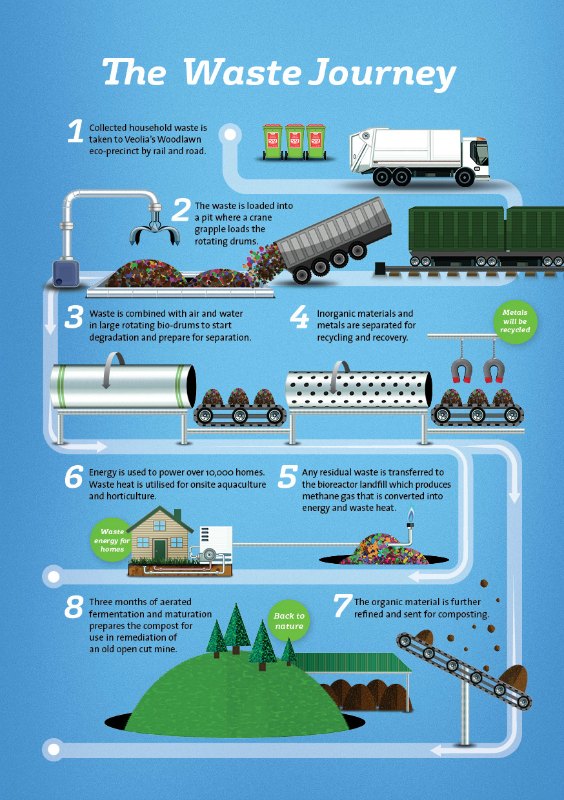In The Cove is regularly asked why Lane Cove Council does not have a FO (Food Organics) Bin or permits the green bins to be used for FOGO (a kerbside collection service that allows food to be added to the green lid garden waste bin so it can be recycled into compost).
Lane Cove Council and four other councils in the Northern Sydney Region send the content of red–lidded waste bins to a purpose-built Mechanical Biological Treatment (MBT) facility at Woodlawn, south of Sydney.
The facility is managed by Veolia, who are responsible for transforming the waste from red-lidded bins in Lane Cove into useful compost for environmental rehabilitation. Based on waste audit data, approximately 50-60% of the waste received is expected to be diverted from landfill. After the organic material is recovered and converted into compost, remaining waste is delivered to a bioreactor for further energy recovery.
This waste processing technology requires a certain percentage of waste in the red bin to be organic to assist with processing composting. This is why Lane Cove Council need organic waste in our red-lid bins.
The diagram below explains how the system converts waste into compost which is then used in the mine rehabilitation of the former Woodlawn mine near Goulburn.

However, this practice may not align with the NSW Government’s Waste and Sustainable Materials Strategy 2041.
This strategy introduced new requirements for councils to provide food and garden organics collections to all NSW households by 2030.
It also requires large food waste-generating businesses to separate food waste by 2025.
The initiatives are designed to reduce organics waste in landfill, where it generates methane, a potent greenhouse gas, and instead, create a clean stream of a valuable resource that can be processed into compost, used to generate energy or converted to animal feed.
FO Pilot Scheme
The Northern Sydney Regional Organisation of Councils (NSROC) decided to research if a FO/FOGO solution would be more beneficial than the current Mechanical Biological Treatment solution.
In 2022 five Northern Sydney councils conducted a food organics waste collection services pilot programme. The pilot involved a trial food organics service for over 2,000 premises across four local government areas between March and July.
The NSW Environment Protection Authority funded the project’s grants to the councils (Hunter’s Hill, Ku-ring-gai, Lane Cove, Ryde and Willoughby) and NSROC.
The trial Food Organics waste collection service encompassed:
- Food organics were separately collected from 706 houses (two areas in Lane Cove) and from 1,447 residencies in three types of multi-unit buildings (four areas of low-rise apartments and townhouses in Ryde, and one area of high-rise apartments in Willoughby); and
- Food organics were separately collected from food businesses and other non-residential premises from a group of 69 food waste-generating organisations (businesses and not-for-profit organisations such as schools), which agreed to participate.
- All premises were offered a food caddy and bin by personal contact, and most materials were either accepted or left at the door after multiple calls at the residence.
A summary of the pilot results is available on the NSROC website here.
One of the major findings was that a significant percentage of organic waste was still being disposed of in the red lidded general waste bin.

An NSROC spokesperson told ITC:
“The research will provide valuable information for all councils in this region as they decide on the best way to manage food organics for the future to waste reduce waste going to landfill and reduce emissions.
Although many people who responded to the survey were very positive, the overall results for the separation and presentation of food waste show just how challenging it will be to provide a cost effective service for residents.
The amount of food placed in the food bin varied between 26% and 47% of the available food and this varied by the type of dwelling. Residents of houses presented more than those in low rise or high rise apartments.
Providing Food Only (FO) or Food and Garden Organics (FOGO) services will require significant additional expenditure on education, materials and collection costs.
Overall, the majority of the available food remained in the red lid bin and so councils will still need to consider how best to manage that waste.
On the basis of this research, the resource recovery of beneficial products from food waste is no better than what would be achieved by processing waste in the red lid bin through a mechanical biological treatment process like that used by six of our councils.”
At the March Lane Cove Council meeting the councillors have been asked to note the report and no actions have been suggested to move forward in the near future with FOGO or FO. See our article here on the next council meeting.
In January 2023, the Minister for Environment James Griffin issued a media release stating that 14 more council areas are receiving NSW Government funding to roll out food organics and garden organics collection services. The Minister stated 56 councils in NSW will soon have the service.
These councils have probably not committed to a Mechanical Biological Treatment like the NSROC councils.
Help Support Local and Independent News













